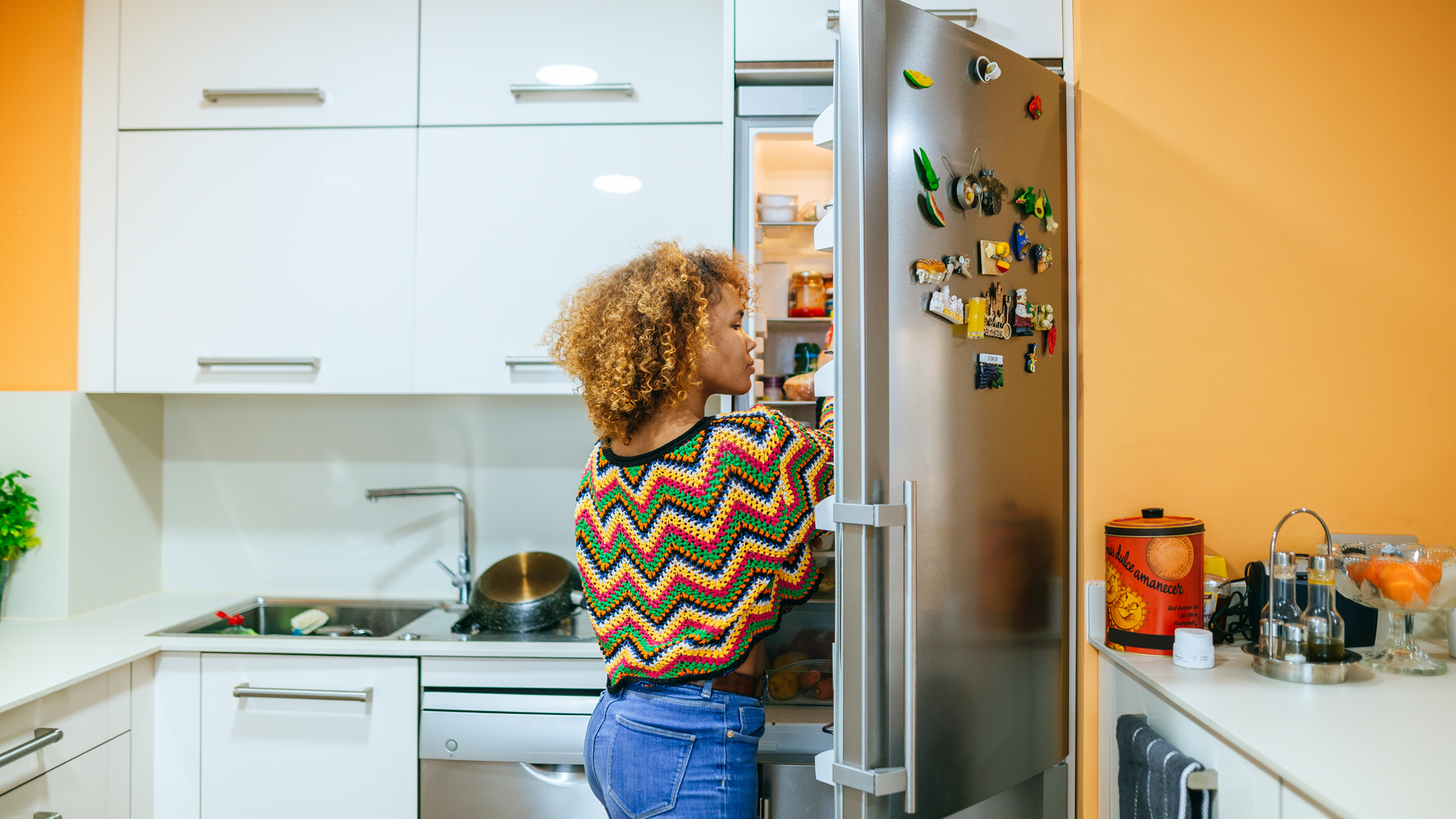What temperature should a refrigerator be? Keep your food in optimal conditions
Find out what temperature a refrigerator should be to keep your food safe to eat.

It's important to store chilled food at the right temperature to keep it safe and prevent spoilage. If you're wondering what the best refrigerator temperature is, you've come to the right place. Setting your fridge too low can lead to frozen food, which isn't ideal either.
If you have one of the best French door refrigerators or a side-by-side model, we've got all the information you need about setting the fridge's temperature, keeping food fresh, and fixing it.
While some high-end refrigerators have features that maintain a constant temperature across all shelves, even these models may need adjustments to stay fresh. We consulted Samsung experts to help you keep your refrigerator as cool as possible, no matter the weather outside.
What temperature should a refrigerator be?
If you find that fruits and veggies go off very quickly in your refrigerator, one contributing factor could be that your fridge temperature is too high. So, what temperature should a refrigerator be? According to the FDA, the best temperature for your refrigerator is 40 degrees Fahrenheit. It’s also worth monitoring the refrigerator's temperature regularly, so if your fridge doesn’t have a built-in thermometer, you can purchase one for as little as $6 from Amazon.com.
Some standard refrigerators don’t even offer cooling across all of the shelves in the fridge, so be sure to check the temperature across various shelves. Suppose you find that the temperature is regularly fluctuating. In that case, you might want to look into getting a repair on your refrigerator’s thermostat because even as little as a few degrees above 40 degrees Fahrenheit can spoil your food.
You might be surprised to learn that the temperature on a refrigerator’s door shelves is usually warmer than in the central part of the refrigerator. Therefore, it's a good idea to keep sauces and jars that don’t rely as heavily on the optimal temperature on the fridge door shelves.

Why is it important to keep your refrigerator cool?
If your refrigerator warms up, it can lead to issues that may affect the food's quality and safety. Refrigerators are designed to keep food at a safe and consistent temperature, usually between 35°F (1.6°C) and 40°F (4.4°C). If the temperature rises above this range, then the following problems may occur:
Sign up to receive the latest news, reviews, buying guides and deals direct to your inbox
Your food may spoil
One of the main concerns regarding a warmer refrigerator is that the higher temperature allows bacteria and other germs to multiply. This may cause the most perishable items, such as meat, leafy greens, or dairy, to go bad.
Your food will have a lower shelf life
When your refrigerator warms up, the shelf life of the food inside decreases. Items that usually last several days, such as buttermilk or fresh cream, may spoil in hours. This is not only a waste of food and money but also a health risk.
Loss of nutritional value
This may surprise you, but a warmer refrigerator can cause specific vitamins and nutrients in fruit and vegetables to break down or deteriorate, resulting in an overall loss of nutritional value.
Increased energy consumption
A warmer refrigerator must work harder to maintain a cool interior, leading to increased energy consumption - this isn't good for the environment or your wallet.
Impact on your freezer
If your refrigerator has a freezer compartment, a warmer temperature may cause it to partially thaw and refreeze as it gets cooler. This can lead to a build-up of ice crystals in your freezer, which can impact the overall efficiency and cause some food to spoil.

"It is crucial to set your fridge-freezer to the correct temperature to minimize food wastage, ensure food doesn’t go off, and maximize enjoyment when consuming your favorite food and drinks."
How to prevent your refrigerator from warming up
There are a few steps you can take to prevent your refrigerator from warming up too much. While these may seem like common sense, it is important to follow them during the warmer summer months when your refrigerator is working overtime to keep your food cool.
You must actively check your refrigerator's thermostat to ensure that the temperature setting is correct and set to the recommended range. If your refrigerator is warmer than the temperature set on the thermostat, there may be a problem with the door seal.
Overloading your refrigerator can also cause it to warm up—overpacking the shelves can impede proper airflow and cooling. To avoid this, you can simply keep the refrigerator clean by removing any spoiled or expired food or things that don't need to be refrigerated, such as vinegar-based sauces or dressings.

Top tips for keeping the contents of your refrigerator cool
Keeping the items in your refrigerator cool during summer is a lot easier than it seems. These top tips can help you to keep your favorite beverages or snacks cold for when you need them most:
• Keep your refrigerator temperature set at 41°F/5°C or below and your freezer set at -0.4°F/-18°C all year round.
Maintaining a consistent temperature will allow your refrigerator to perform more efficiently during the warm summer months as there is less of a change in temperature to make.
• Make sure your fridge-freezer is situated at least 5cm from the walls on both sides and 10cm from the wall at the rear.
If the fridge-freezer isn't well-ventilated, the freezer temperature could rise, and food may start to defrost when the overall room temperature starts to rise. Leaving an adequate gap will allow cool air to circulate around the refrigerator, keeping the contents chilled.
• Don’t keep your fridge-freezer in a conservatory or direct sunlight during summer.
These locations are likely to exceed 104°F/40°C during warmer sunny days, which can cause your refrigerator's temperature to rise dramatically. This may also lead to an increase in power consumption from your refrigerator trying to stay cool.
• Do not keep ice creams or ice lollies in the doors
The inside of the door is usually one of the warmer parts of your fridge-freezer. This can lead the items inside to defrost faster, resulting in softer, warmer popsicles and ice creams.

How long is food OK in the fridge without power?
If there’s a power outage and your refrigerator cuts out, your food will be safe to eat if it’s left in the fridge for up to four hours and the door remains closed, according to the FDA. If you take food out of the fridge, the FDA recommends using the “two-hour rule,” which means that if any foods that should be refrigerated are left out for more than two hours, you should discard them.
If you take any food out of the refrigerator and it has a bad odor, do not eat it—especially meat and dairy. Keep foods as long as possible, allow room between items in your fridge, and cover foods adequately to stop bacteria from spreading.

How to save food if your refrigerator breaks
There’s nothing more annoying than when your refrigerator packs up, and you’ve just filled it with fresh food. Not only will you risk foods going off and making you poorly, but a broken refrigerator could also mean a big waste of money spent on groceries.
As we mentioned above, you’ll have up to four hours to keep your food fresh, so you need to act fast if you don’t want to lose it. Keep your refrigerator door closed as much as possible, but if you have a cooler, place the foods with the longest use-by-life left in them, along with lots of ice. It’s best to keep all raw meats together and separate from other foods, so if you have more than one cooler, dedicate a separate one to meat.
You may have to throw some food out, so it’s best to choose items that are closest to expiring. You might also find that some foods in your fridge won’t actually need to be refrigerated—some sauces and jarred items don’t require refrigeration.
If it’s only been a few minutes since your refrigerator stopped working, consider what you could cook or eat immediately. Some foods can be cooked to use them up, and by the time they’ve cooled down and need refrigerating, you may have found an alternative to replace your refrigerator.
Sophie is Home Editor at Top Ten Reviews. Starting off her career in print journalism, Sophie then moved to digital and now specializes in lifestyle, home interiors and social media. While she has scooped awards for her journalism, Sophie likes to whip up a storm in the kitchen when she's not writing.
- Monib ZahdehTTR Staff Writer

